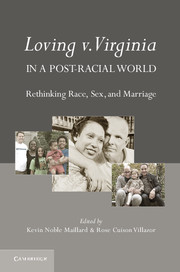Book contents
- Frontmatter
- Contents
- About the Contributors
- Acknowledgments
- Foreword
- Introduction Loving v. Virginia in a Post-Racial World
- Part One Explaining Loving v. Virginia
- Part Two Historical Antecedents to Loving
- Part Three Loving and Interracial Relationships: Contemporary Challenges
- Part Four Considering the Limits of Loving
- 11 Black Pluralism in Post-Loving America
- 12 Political Blackness
- 13 Finding a Loving Home
- Part Five Loving Outside the U.S. Borders
- Part Six Loving and Beyond: Marriage, Intimacy, and Diverse Relationships
- Permission Granted
- Index
- References
11 - Black Pluralism in Post-Loving America
Published online by Cambridge University Press: 05 July 2012
- Frontmatter
- Contents
- About the Contributors
- Acknowledgments
- Foreword
- Introduction Loving v. Virginia in a Post-Racial World
- Part One Explaining Loving v. Virginia
- Part Two Historical Antecedents to Loving
- Part Three Loving and Interracial Relationships: Contemporary Challenges
- Part Four Considering the Limits of Loving
- 11 Black Pluralism in Post-Loving America
- 12 Political Blackness
- 13 Finding a Loving Home
- Part Five Loving Outside the U.S. Borders
- Part Six Loving and Beyond: Marriage, Intimacy, and Diverse Relationships
- Permission Granted
- Index
- References
Summary
“There is something called black in America and there is something called white in America and I know them when I see them, but I will forever be unable to explain the meaning of them.”
Since 1967, the number of multiracial individuals with some African ancestry living in the United States has increased dramatically as a result of increased out-marriage by black Americans and the immigration of large numbers of multiracial individuals from Mexico, the Caribbean, as well as Central and Latin America. With the removal of national origin quotas in the 1965 immigration reform law, more people with some African ancestry have entered this country over the past forty years than at any other time in our history. Consequently, the face of late-twentieth and early-twenty-first-century America has changed, as have attitudes about race, especially about persons with some African ancestry.
Much of the conventional public, political, and judicial rhetoric, however, does not reflect the heterogeneity of African Americans. The ongoing rhetoric of monoracialism may be the by-product of at least two factors. Legally, the law played a dominant role in constructing and reifying a “single” black race. Throughout the twentieth century, blackness in America was “seen as so self-evident” that one was considered black if one’s African ancestry was visible or known. Politically, scholars have long contended that diversity within the black community was suppressed for strategic purposes, so that monoracialism could become a unifying and primary organizing principle in the fight against race discrimination. These legal and political accounts of blackness continue to this day.
- Type
- Chapter
- Information
- Loving v. Virginia in a Post-Racial WorldRethinking Race, Sex, and Marriage, pp. 155 - 168Publisher: Cambridge University PressPrint publication year: 2012



